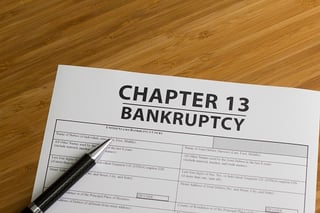Scura, Wigfield, Heyer, Stevens & Cammarota Blog
- Blog
Frequently Asked Questions that You Always Wanted to Know in a Chapter 13 New Jersey Bankruptcy
 Q. What is a Chapter 13 Bankruptcy?
Q. What is a Chapter 13 Bankruptcy?
A Chapter 13 Bankruptcy is a reorganization-type bankruptcy that lets debtors save property and potentially pay off a smaller percentage to their creditors over the life of a 36 to 60 month plan. Typically, a Chapter 13 Bankruptcy in New Jersey is used by someone trying to save a house, home or real estate from a foreclosure. If your home is in foreclosure, the Chapter 13 allows you to restructure the amount you fell behind on your mortgage over a five year plan. Chapter 13 can be used by individuals and also small business owners. In representing clients, below are just some of the frequently asked questions that I encounter.
Q. How long will I have to catch up on the amount I fell behind on the mortgage?
A. You have up to five years or 60 months to restructure the amount you fell behind on a mortgage. For example, if you are $30,000 behind on your mortgage. You can take this $30,000 and repay it over a 60 month repayment plan. In this example, the payments would be $500 a month for 60 months, not including trustee's commissions.
Q. Do the payments have to be in equal installments to catch up on the amount I have fallen behind?
A. No. You can structure lower amount of payments in the beginning and then increase over time as the plan progresses. For example, if there is $15,000 in arrearages on the mortgage, you could pay $100 per month for the first 12 months and then $287.50 over the remaining 48 months, not including trustee's commissions. The plans can be very creative and structured in different ways depending upon your situation. Additionally, as loan modifications become more prevalent, you may be able to get the bank to modify the mortgage in the Chapter 13 bankruptcy.
Q. Will the filing of a Chapter 13 Bankruptcy stop a foreclosure or even a sheriff sale?
A. Yes. The filing of a Chapter 13 Bankruptcy will stop a foreclosure or sheriff sale and give you a chance to catch up on payments. You can then structure a plan to catch up on the amounts on the mortgage you have fallen behind or even attempt a loan modification.
Q. Can I strip off or wipe out a second mortgage or home equity line of credit?
A. Yes. If the house is worth the same or less than the first mortgage, then you can strip off the second mortgage, home equity line or any liens behind the first mortgage. This is a powerful tool in bankruptcy to wipe out those liens and mortgages where real estate property values have dropped.
Q. Can I restructure IRS or other tax debt?
A. Yes, a great benefit of a chapter 13 is that you can restructure IRS or State tax debt over a 60 month or five year plan. Certain tax debts are completed dischargeable and can be wiped out depending upon the type and age of the debt. A common misunderstanding or myth is that tax obligations cannot be wiped out. Some tax obligations can be wiped out.
Q. In what ways is Chapter 13 different from Chapter 7 bankruptcy?
A. The main advantage of Chapter 13 over Chapter 7 bankruptcy is that it lets the debtor save assets, which would definitely be liquidated by a bankruptcy trustee in a Chapter 7 case. As stated above, a chapter 13 bankruptcy also allows you to restructure mortgage debt allowing you to cure arrears (the amount you fell behind) on the mortgage. In addition, under Chapter 13 you will most likely pay a percentage on your unsecured debt, such as credit cards, medical debt and personal loans. With a Chapter 13, it will take you less time to build up a good credit history again since Chapter 13 bankruptcy will not be kept on your record for as long as Chapter 7. Chapter 13 bankruptcy also gives you the chance to discharge those debts that might be considered non-dischargeable under other bankruptcy chapters.
In a Chapter 7 bankruptcy you usually do not pay any debt after your bankruptcy discharge is granted by the court. A chapter 7 is quicker and easier than a chapter 13. Most cases filed are chapter 7 cases. A person receiving a Chapter 7 bankruptcy discharge gets a so-called "fresh start" with respect to his/her financial affairs.
Q. How long does a Chapter 13 repayment usually last?
A. Most Chapter 13 repayment plans are 5 years or 60 months, but it may be a shorter plan depending on income and ability to pay. If a plan is confirmed, it can also be paid off early. A large variable in the length of the plan depends on the sum of money you can afford to pay monthly after accounting for your basic living expenses. Many of the amounts of the deductions you are permitted to take are determined by the IRS standards.
Q. How does Chapter 13 bankruptcy affect the debtor's credit history?
A. The impact of Chapter 13 bankruptcy on the debtor's credit report is negative, but not as bad as that of a Chapter 7
Q. Can I save a car when I am behind on a car loan?
A. Like home mortgages, car loan defaults can be cured under Chapter 13. You can catch up on the payments that you have fallen behind over 60 months. The car finance company cannot repossess the car. You may also be able to restructure the loan depending upon the age of the loan and the value of the car.
Q. Are there any debt limitations for a Chapter 13?
A. Yes. To be eligible, you cannot have more than $1,010,650 in secured debt and $336,900 in unsecured debt. If you have more than that, you should ask a lawyer about Chapter 11. These limits change with time according to Federal Statute, but these are the present limits as of this writing.
Q. If I file Chapter 13 and later decide I want to sell my house, can I?
A. Absolutely. You can propose a sale plan where you propose to sell the house over a specified time frame. A sale plan can provide the advantage of more time to market and sell the house so that you do not have to sell it for a deep discount. An example of a sale plan is payments of $100 per month for 12 months until the house is sold.
If you have questions about chapter 13 or other bankruptcy chapters, please contact one of our New Jersey bankruptcy attorneys.
We are a debt relief agency. We help people file for bankruptcy relief under the Bankruptcy Code.
Share Article
Need Help? Contact Us Today!




Lists by Topic
- Bankruptcy (310)
- Personal Injury (89)
- Chapter 13 (50)
- Chapter 7 (50)
- Debt Management (50)
- Foreclosure (47)
- Accident (28)
- Car Accident (25)
- Chapter 11 (24)
- Business Bankruptcy (19)
- Credit (18)
- Insurance Claims (16)
- Business Law (11)
- Employment Law (11)
- Litigation (11)
- Probate and Estate Law (11)
- Attorney (10)
- Consumer Bankruptcy (10)
- Damages (10)
- Medical (10)
- Product Liability (10)
- Divorce (8)
- Workers Compensation (8)
- Slip and Fall (6)
- Commercial & Residential Real Estate (5)
- Premises Liability (5)
- Repossession (5)
- wrongful death (5)
- Contracts (4)
- Family Law (4)
- Video | Bankruptcy (4)
- Bankruptcy Cost (3)
- Corporate Litigation (3)
- Trial Law (2)
- student loans (2)
- tax (2)
- Attorney Fees (1)
- COVID-19 (1)
- Certified Civil Trial (1)
- Custody (1)
- Dog (1)
- Dog Bites (1)
- News (1)
- Relocation Assistance (1)



